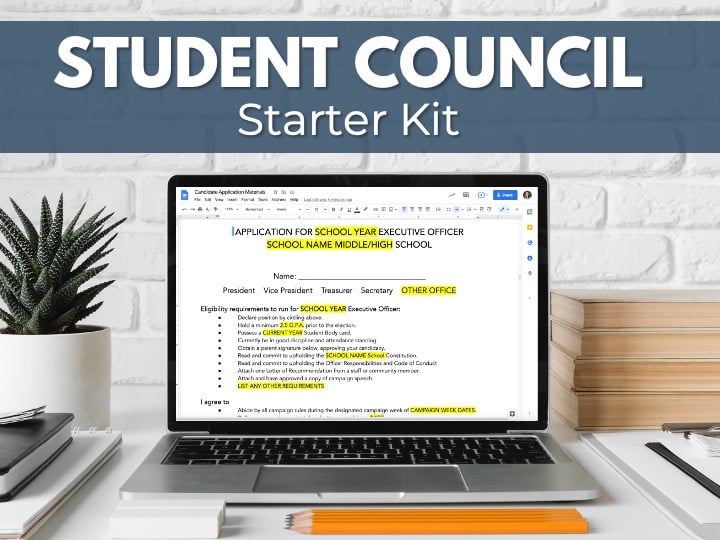Planning a student council election for the first time can be intimidating. Especially since it’s something you really don’t want to mess up!
The great news is that school elections will generally follow a rinse-and-repeat formula from year to year, but that’s only once you have a solid system in place. That system can take a few years to develop, especially if you inherited little more than the title of advisor from your predecessor. Hopefully, though, with these tips you can cut out much of the trial and error, even in your first year.
It’s important to remember that conducting a student council election is more than just the logistics of what happens when. You want to ensure your election procedures don’t exclude students from participating and that they are fair, open, and honest to both candidates and voters.
Whether you’re a new student council advisor or looking to fix what hasn’t been working for a while, you are in the right spot. With a month or so lead time you can create a much less stressful election this year. And then you’ll have a plug-and-play system ready to go for next year.
These tips, plus all the forms needed to create that stress-free system (plus a whole lot more!) are available in my Student Council Starter Kit. In it, you’ll get editable application forms, ballot templates, and a much more step-by-step timeline for organizing your election.
Here’s a snapshot of my tried-and-true system for how to plan a successful student council election:
3 to 4 Weeks Prior: Form Committee & Recruit
First, have your current officers and/or Leadership class share their thoughts and hopes they have about the upcoming election process and what traits they would like to see in next year’s officers. This could be done through private written reflections or whole-group discussion.
This is important because there could easily be concerns or complaints you aren’t aware of, as well as perspectives you hadn’t thought of about how the elections have been run in the past. By asking early, you can make any necessary changes for this year.
A great question to pose is “What might be preventing some students from running for office?”
If it’s uncertainty of what the responsibilities entail, you can be better at making the officer job descriptions available. If it’s not wanting to run against people for fear of losing, then you can have all the candidate sign-ups be secret until the deadline has passed.
Really ask yourselves if there’s anything about the election process that unduly excludes students.
Next, create a committee with students (who won’t be running for any offices) to coordinate the multi-week event.
Lastly, invite your student leaders and fellow staff members to begin encouraging students they think would make great officers to consider running. Often a student who has never considered themselves “officer material” will need a few weeks to get comfortable with the idea, so start early with those nudges!
2 Weeks Prior: Prep the Paperwork
Review, update as needed, and copy the candidate application packets for all the offices that’ll be on the ballot. This task is best left to you, the advisor, to ensure they’re correct.
I like to keep the application on paper, rather than digital, because of the various signatures required. Use my application packet template if you need a starting point.
Check in with your committee about how their planning is going. This week, they should be finishing making recruitment posters and building the timeline of Election Day events, whether that involves an in-person assembly or gathering speech videos for in-classroom viewing. See below in the “Day Of” segment for the general itinerary we use.
The good thing about the timeline is that once you get one that works, it shouldn’t need much tweaking year to year. With that in mind, it’s a must to keep a detailed one stored with your other election files!
Walk through the timeline of the next two weeks with students, detail by detail, so everything’s accounted for. One thing to be sure to check for is if there’ll be students who will miss the speeches or voting for something like an off-campus class or a field trip that day. Work with your committee to determine if there’s a way they can still participate.
This is the week also when you should begin broadly promoting and recruiting, if you haven’t already started—blurbs in the daily announcements, hanging posters in the halls, posting to social media, etc.
Week Prior: Open for Candidate Applications
Give students a week to pick up an application packet, complete it, and turn it in. I like having Friday morning before school be the deadline so that there is still time to handle any issues, like a missing signature, which is bound to happen.
When students pick up an application, write down their name and what office they are applying for. That way you can follow up with them as well as change your recruitment messaging if you have a race that needs more candidates.
Having a thorough candidate application where students pre-verify and commit to all the requirements of the job prior to even running for office is by far my strongest piece of advice. It prevents so many headaches, like an officer having a conflict with the mandatory summer leadership camp or not being able to take Leadership class the next year.
Of course, if you’re brand new you have little idea what those things even are! That’s why I put all these forms together in my Student Council Starter Kit. Things like:
- Election rules and procedures agreement
- Officer code of conduct agreement
- Job description and commitment agreement
- Academic and behavior verification
- Parental permission, including any extras like for summer leadership camp
- Copy of the study body’s constitution to agree to uphold
I would rather have a thick packet of things for students to sign as candidates, and not a single thing for them to sign the entire year they’re in office, than the other way around.
Additionally, require students to submit their campaign speech text (or finished video) as part of their application. That way you have plenty of time to review them for appropriateness as well as avoid hassling students during Campaign Week to get them in with time for review.
The Week Of: Campaign Week
If you hold Election Day on a Friday, it allows for a clear-cut official Campaign Week. This is when students can hang posters and any other allowed campaigning.
With your election committee, run through the final details of Election Day. Also, make the ballots, whether that’s digital (like a Google Form) or paper. If you’re using paper ballots distributed to classrooms, give yourself time to count off blank ballots, including a sealable security envelope for their return.
You may also want to send out email reminders to your candidates: one on Monday about what is and isn’t allowed during campaigning and one on Thursday with the Election Day schedule.
Send a third one to staff with details of Election Day procedures and what support you need from them to make the speeches and ballot casting go smoothly.
Be sure to save these emails to reuse!
Day Of: Election Day
It’s best to have the candidates deliver their speeches in the first half of the day. Doing so automatically sets the tone that it’s a formal event.
Have students cast their ballots as soon as possible after the speeches are given. Make sure teachers are clear how to securely return paper ballots. If possible, have a designated adult go around and pick them up.
Ideally, two office staffers should count and verify the vote. Once an official tally has been made, call all the candidates down to privately share the results. This allows students to formally accept their positions, as well address any unusual results that may happen. You want everything confirmed before announcing results to the entire school.
We usually announce the winners in the final minutes of the day and ask all candidates to take down any posters before leaving for the weekend.
Check with your state student council association about what, if any, ballot records must be kept and for how long.
Week After: Reflect & Welcome New Officers
First, congratulate yourself and your leaders for conducting the fair, open, and honest election that you set out to.
Next, while it’s all still fresh in everyone’s mind, hold a debrief session to identify what went well and what had issues. Be sure to record those suggestions and ideas for next year and store them with your election files. If tweaks need to happen—say, clarifying a specific campaigning rule or changing one of the application requirements—change the forms now. Don’t think you’ll remember them next year.
Also, the last things your election committee and outgoing officers need to do is celebrate and prepare for the incoming officers. Create a “here’s next year’s officers” bulletin board, hold a meeting to connect new and old officers, and plan for the official swearing-in ceremony at your end-of-year assembly.
A tradition we do at my school is have the outgoing officers decorate and write a note of wisdom in Moleskine-style journals and gift them to the incoming officers. They are perfect to take to summer leadership camp, as well as to use throughout the next year for jotting down ideas, meeting notes, etc.
If you’d like to take the chaos out of planning your upcoming student council election, check out my Student Council Starter Kit, which includes all the forms you’ll need, like a candidate application packet, ballots, and more. Also included is everything to tackle all the other parts of being a student council advisor—meetings, officer duties, the constitution. The best part is everything is editable. If you are just starting out or looking to get more organized, this is a must!

Feature image credit: Karolina Grabows







